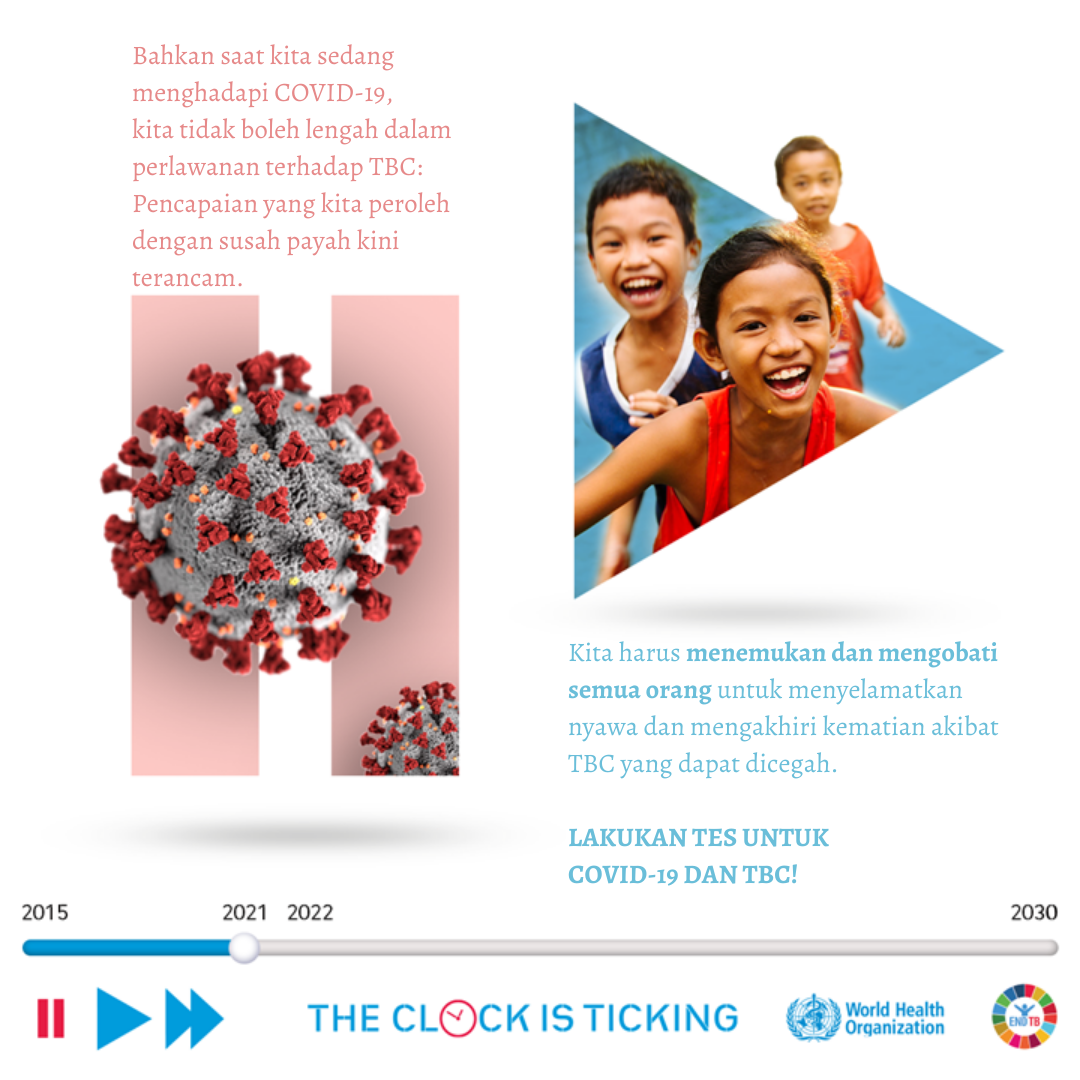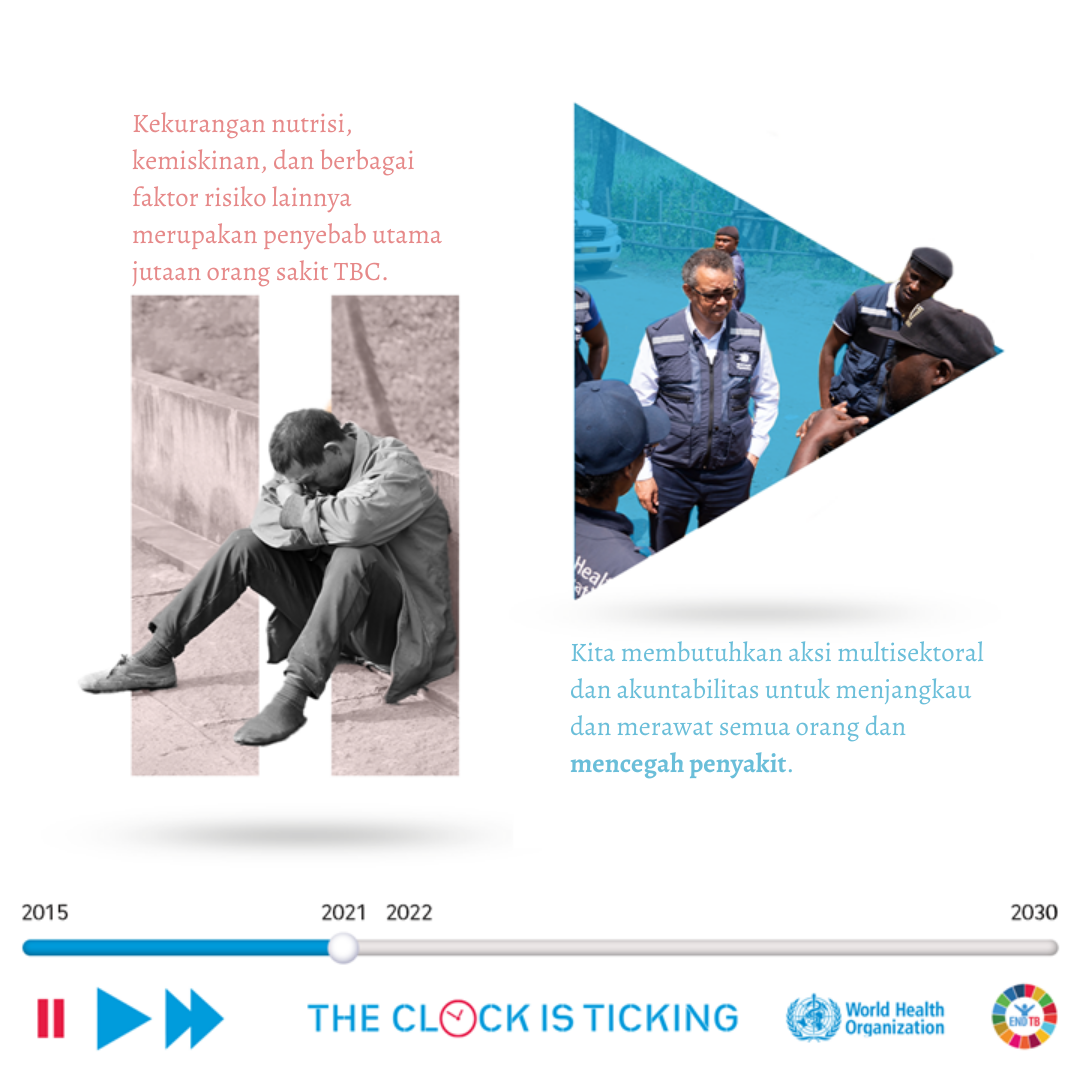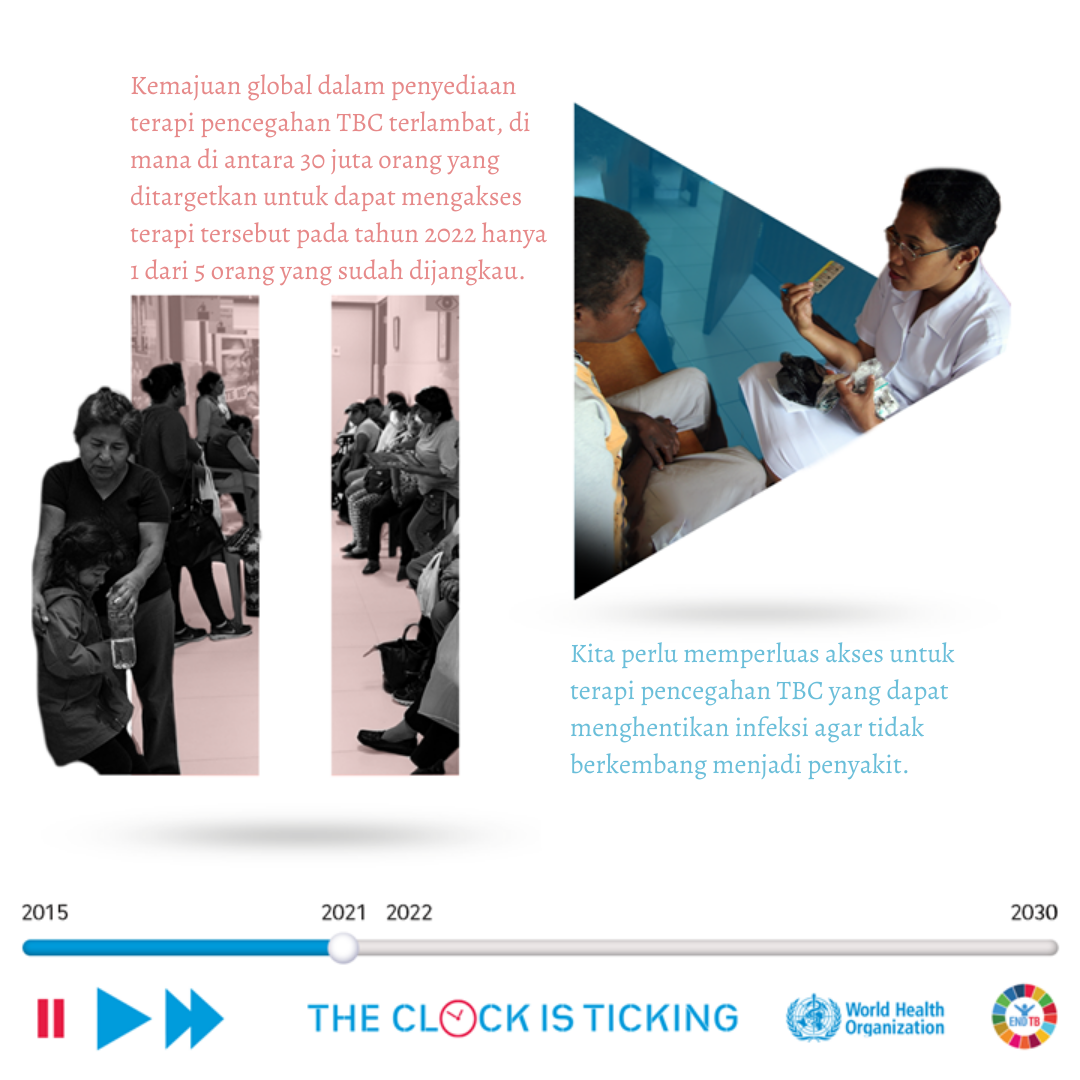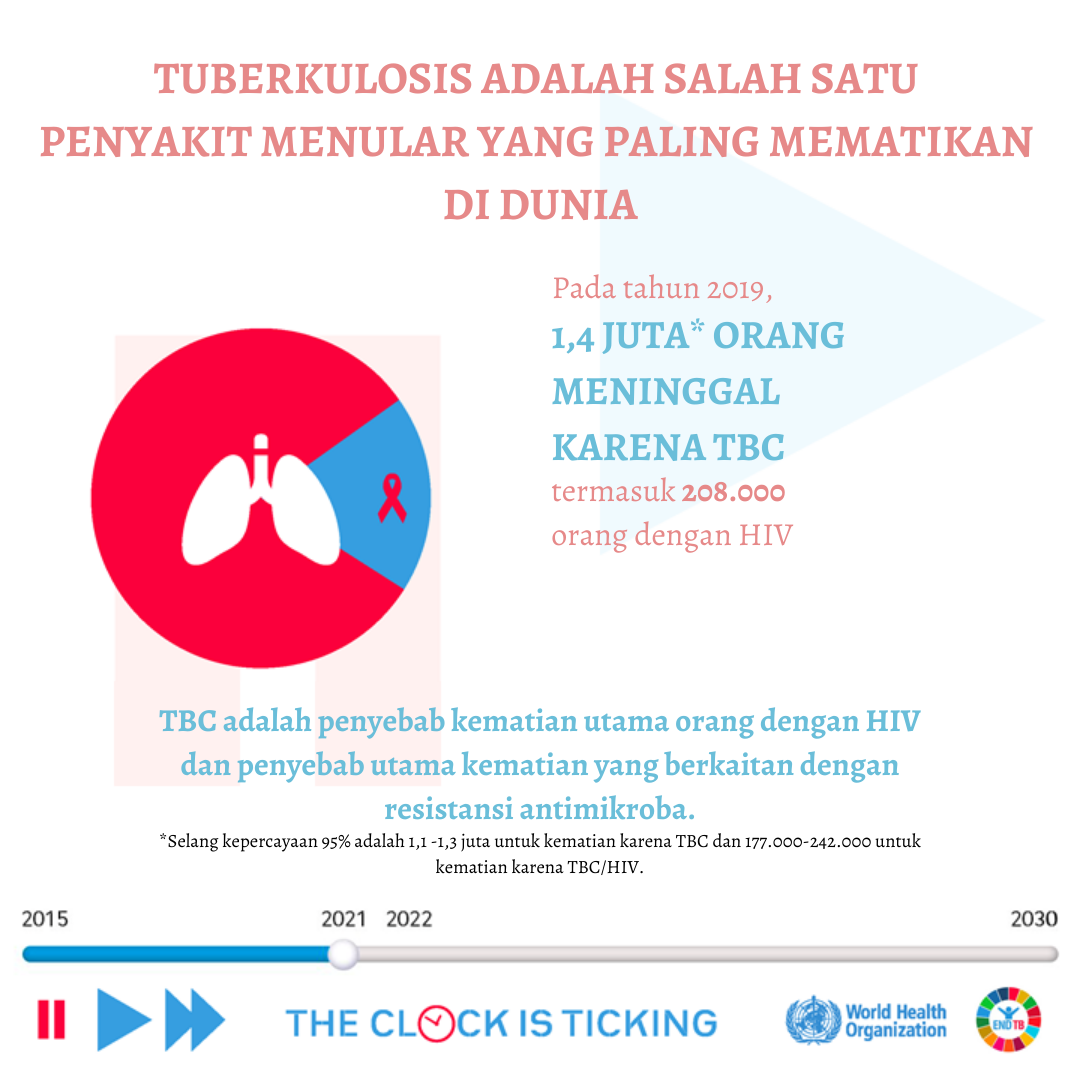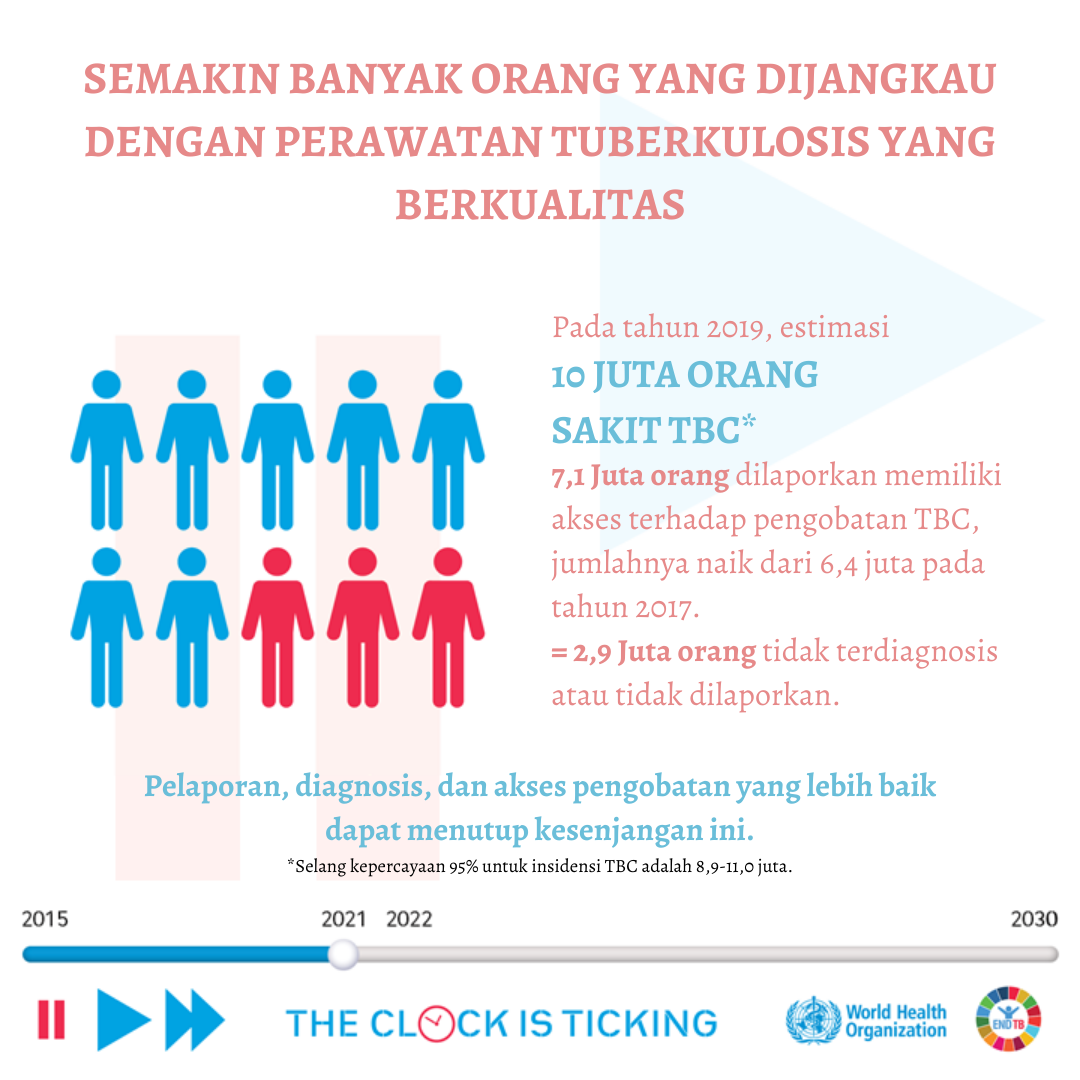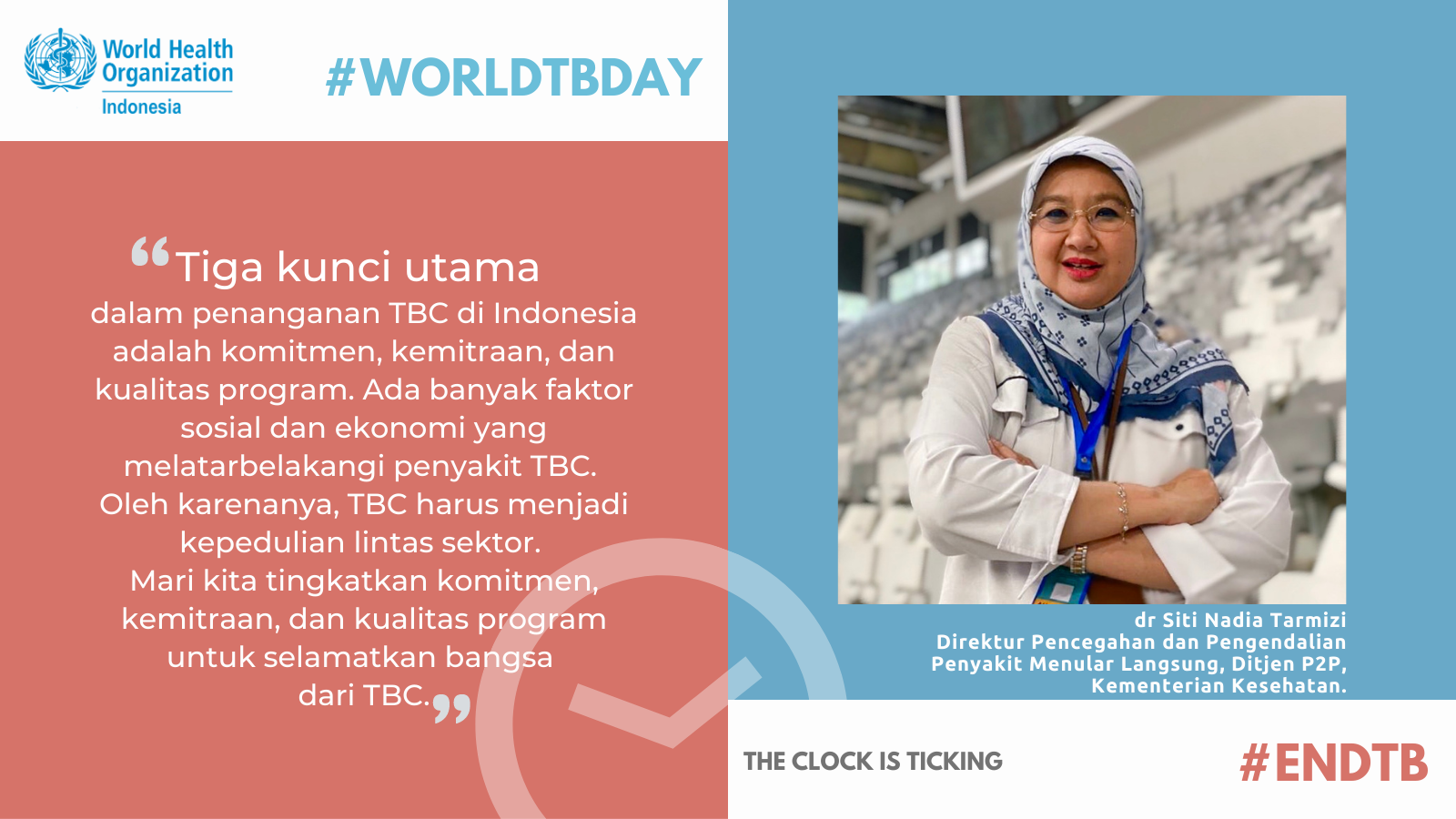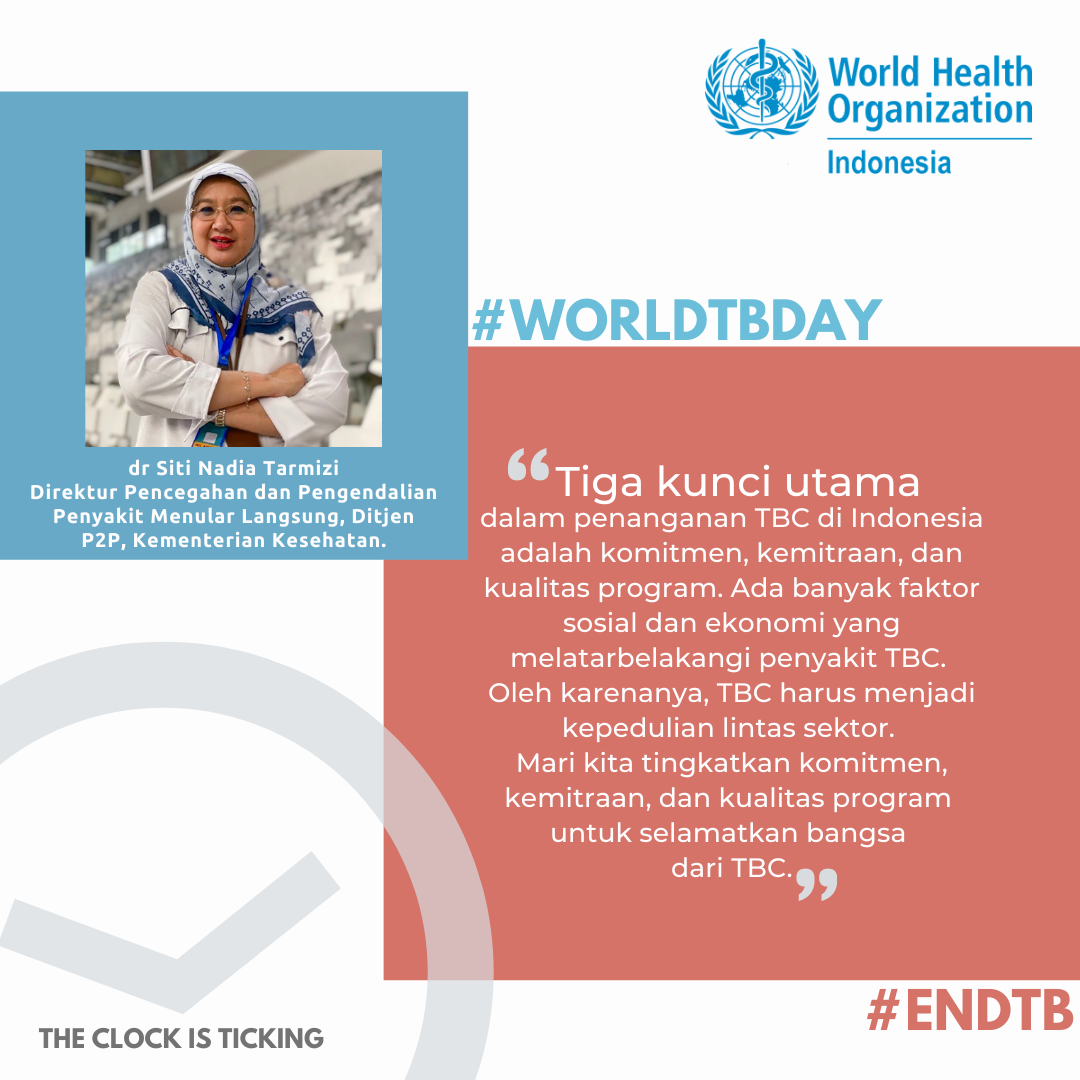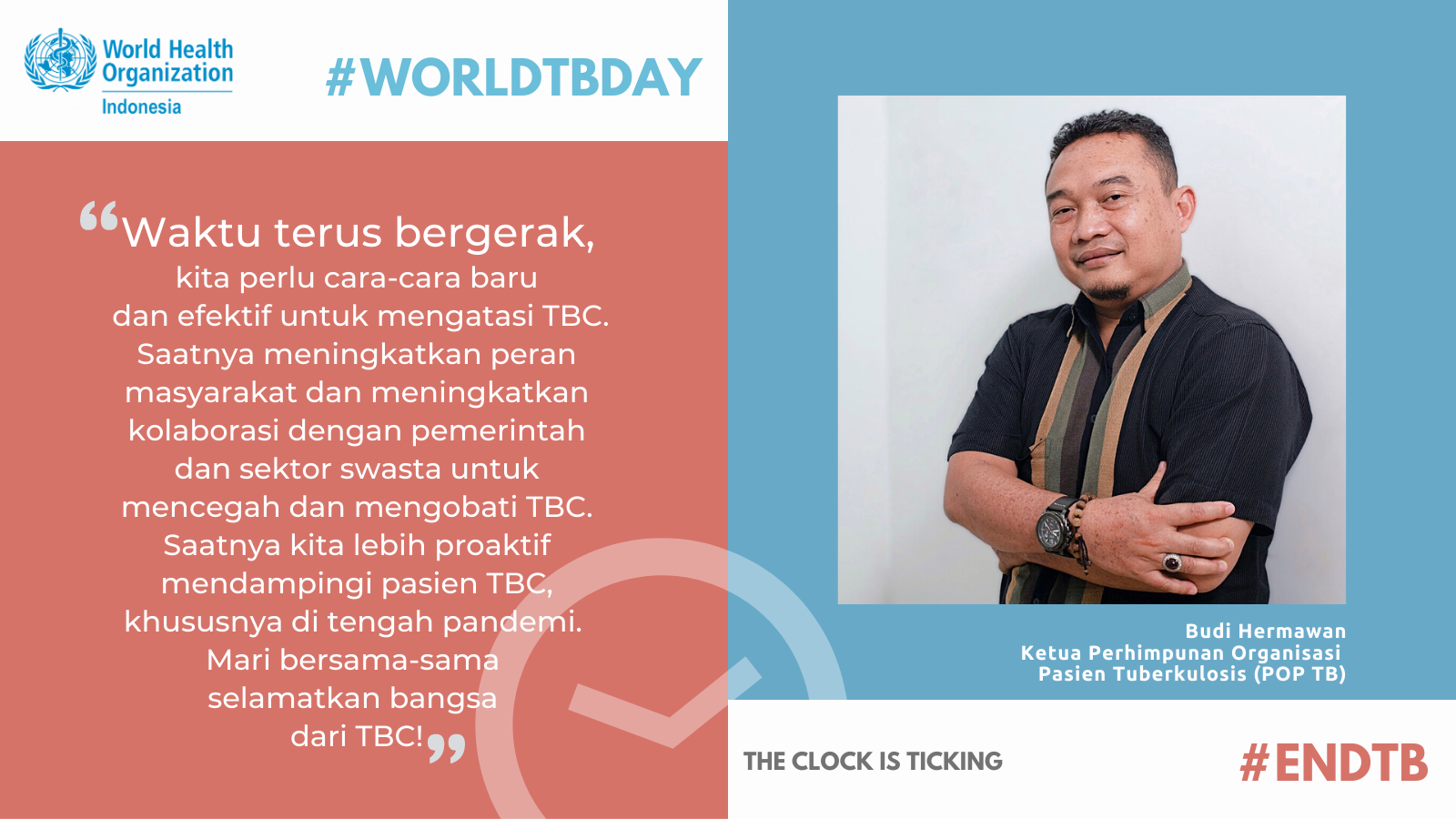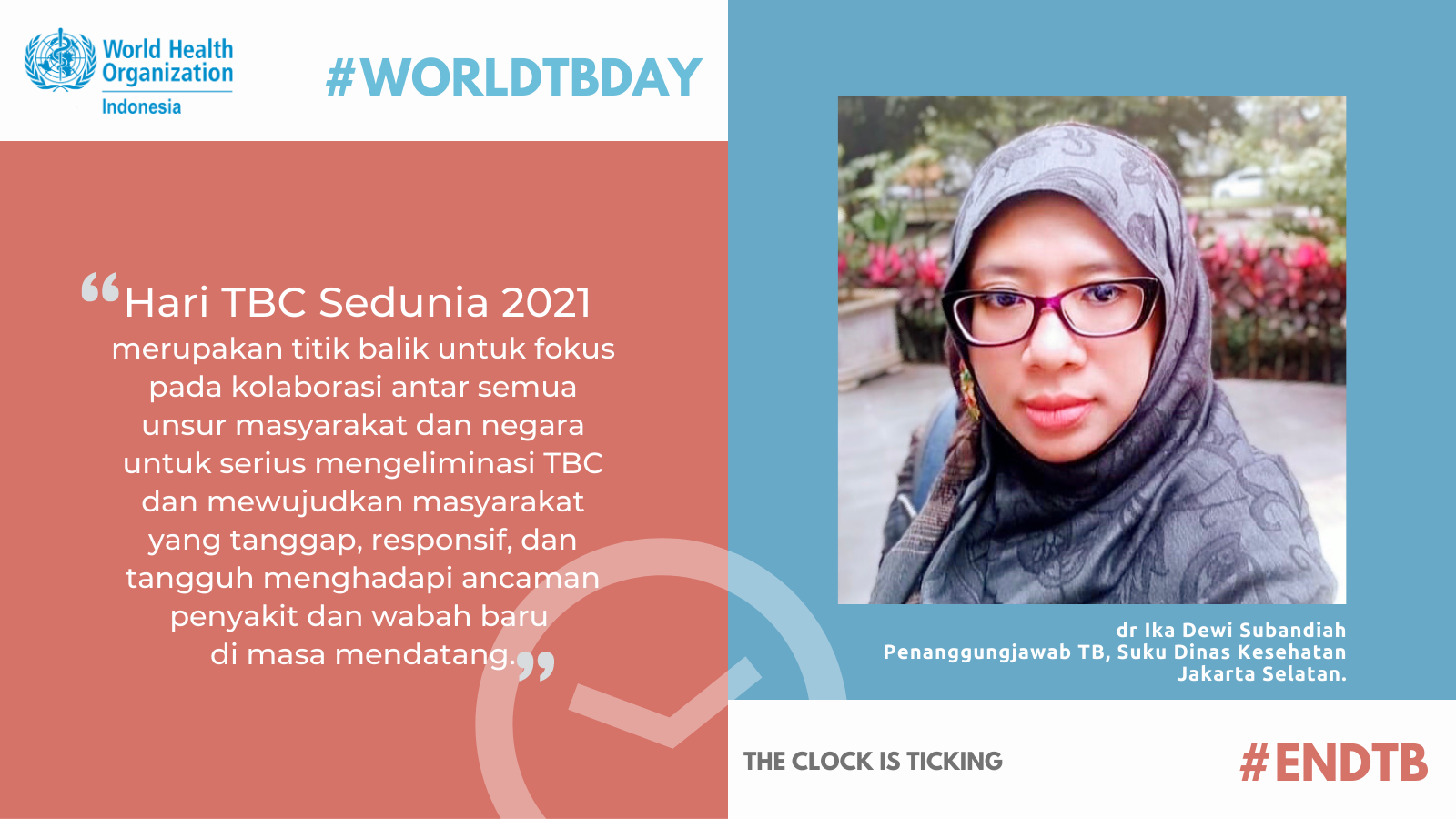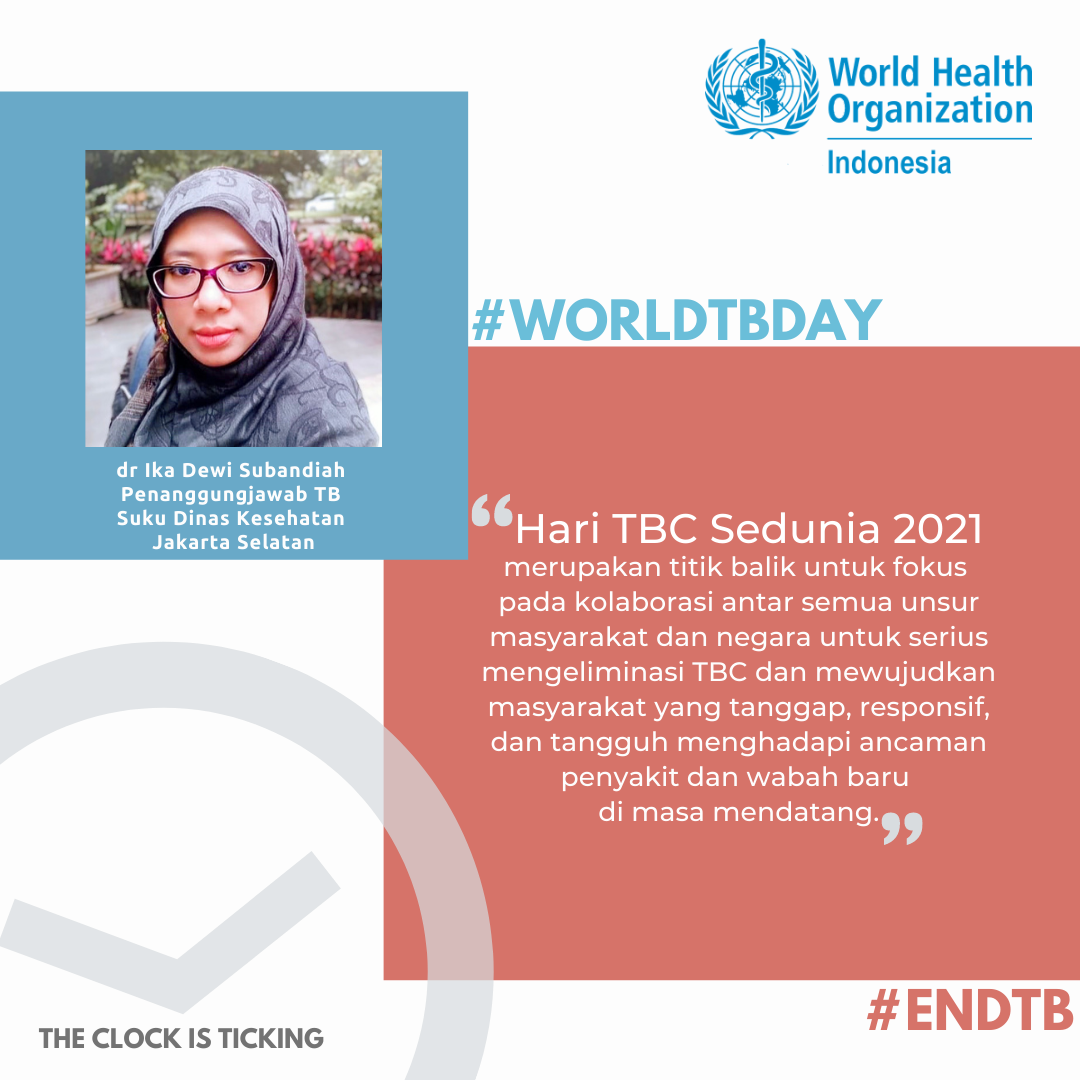
World Tuberculosis Day 2021

World TB Day 2021 Making TB everyone’s business – Indonesia’s path towards eliminating TB
Indonesia is making a steady progress towards elimination of TB, with a goal of reducing TB incidence to 65 per 100 000 population by 2030. The Ministry of Health, with the support of WHO and a vast TB advocates network are intensifying efforts to eliminate TB, by focusing on stakeholders’ commitment, engagement of providers, greater community involvement, finding missing cases, improving quality of TB care and scaling up TB prevention. Indonesia reiterated its commitment to end TB with the launch of 'Joint Movement towards TB Elimination by 2030' by the President Joko Widodo in January 2020. Continuing from this highest-level commitment, a Presidential degree to End TB will be issued on occasion of the World TB Day 2021. The Decree would mandate tackling tuberculosis as one of the development priorities for subnational governments and is expected to create a far-reaching impact across the country. Governors and Heads of districts are expected to update subnational-level TB action plans and actively mobilise resources to control TB, including reliance on public-private partnerships.
"TB elimination should become everyone's business. Many social and economic determinants affect TB; thus, TB control responsibility is not confined only to the health sector domain. It is a multidimensional problem that calls for multisectoral interventions," said the Ministry of Health Director for Communicable Diseases Prevention and Control, Dr Siti Nadia Tarmizi.
To broaden outreach of the National TB programme, the Ministry of Health has partnered with several national ministries, including the Ministry of Education and Culture, the Ministry of Public Works and Public Housing, the Ministry of Social Affairs, the Ministry of Home Affairs, and the Ministry of Villages Disadvantaged Regions, and Transmigration. This partnership will enable these ministries to contribute to the reduction of TB burden in the country through their responsibility domains; for example, the Ministry of Education will include tuberculosis prevention and control in the health promotion programme designed for schools, while the Ministry of Public Housing would support subnational health offices in conducting TB screening for tenants.

Caption: Drug-resistant TB clinic in Pasar Minggu Hospital, South Jakarta. TB case notification has increased by 11% in DKI Jakarta in 2018-2019, as a result of cross-sectoral partnership between the health office and other departments. Photo credit: Yoana Anandita/WHO Indonesia
Some quick wins from these cross-sectoral partnerships are already visible at the subnational level. For instance, TB case notification increased by 11% in DKI Jakarta during 2018-2019. The Jakarta Provincial Government has established a 'TB Communications Forum' comprising departments of housing, cleanliness and education, universities, and various private institutions with an aim to bring together subnational multisectoral stakeholders in the fight against TB.
In collaboration with PD Pasar Jaya, Jakarta City's market operator, the South Jakarta Health Office has conducted free TB screening of 685 shopkeepers and workers in nine traditional markets in November 2019. As a result of this innovative TB case finding approach, around 73 presumptive TB cases were quickly followed up at community health centres. This model of active case finding will be implemented in other public places in the city to help curb the transmission of TB.
With partnerships and enhanced community surveillance, the number of reported TB cases has increased by 75 percent during the last four years, from 330 729 in 2015 to 578 987 in 2019, as observed from the data available with the Ministry of Health.
Role of TB survivors in the TB programme
The Ministry of Health continues to expand TB services across the country and improve the quality of TB services provided to patients. To date, 1 268 rapid molecular test machines have been provided to hospitals and community health centres (puskesmas)
across Indonesia, and a plan is in place to expand to additional 1000 new sites during 2021-2024 to enable fast and accurate diagnosis of the disease. Specialised drug-resistant TB (DR-TB) services are available in 292 referral hospitals with
referral mechanisms from health centres from across Indonesia. WHO continues to support the Ministry of Health to adopt the TB care and prevention strategy and implement the latest guidance to maintain TB services in the context of COVID‑19 pandemic.
At the heart of Indonesia's fight against TB are patient supporters and community counsellors, mainly TB survivors. For many years, TB survivors have played a key role in ensuring treatment adherence for DR-TB patients. Increasingly, TB survivor organisations
are stepping up their role to become strategic partners contributing to achieving the targets of the national TB programme and providing inputs in policy development.
"Our strategy is not to wait passively for patients to approach us because the clock is ticking. We try to be more proactive to do home-visits and assist patients during their treatment," said Budi Hermawan, Chairman of Indonesian TB Patient Organization
(POP TB). "The COVID-19 pandemic has revealed real inequities faced by TB patients. Due to stigma, some of them are at risk of losing their jobs. Through POP TB patient organisation and STOP TB Partnership Indonesia, we advocate for TB patients with
a severe condition in accessing the Family Hope cash transfer scheme under the Ministry of Social Affairs. We also assist TB patients who are discriminated in the workplace to ensure their rights as a patient and employee can be fulfilled."
Recognising TB survivors' significant role, WHO supported a virtual training for TB survivors in 2020 to accelerate response to DR-TB in Indonesia. A batch of 60 representatives from 16 TB survivor organisations were trained to improve their TB literacy, counselling and advocacy skills, and also strengthen their capacity to be involved in policy development, planning, and resource mobilization.
The clock is ticking and the time to translate commitments into action is now. Tuberculosis needs to be eliminated in Indonesia by scaling up actions, strengthening the health system, and ensuring community support. All stakeholders must act together, finding innovative ways especially in the midst of COVID‑19 pandemic, to ensure achievement of the national TB programme targets.

